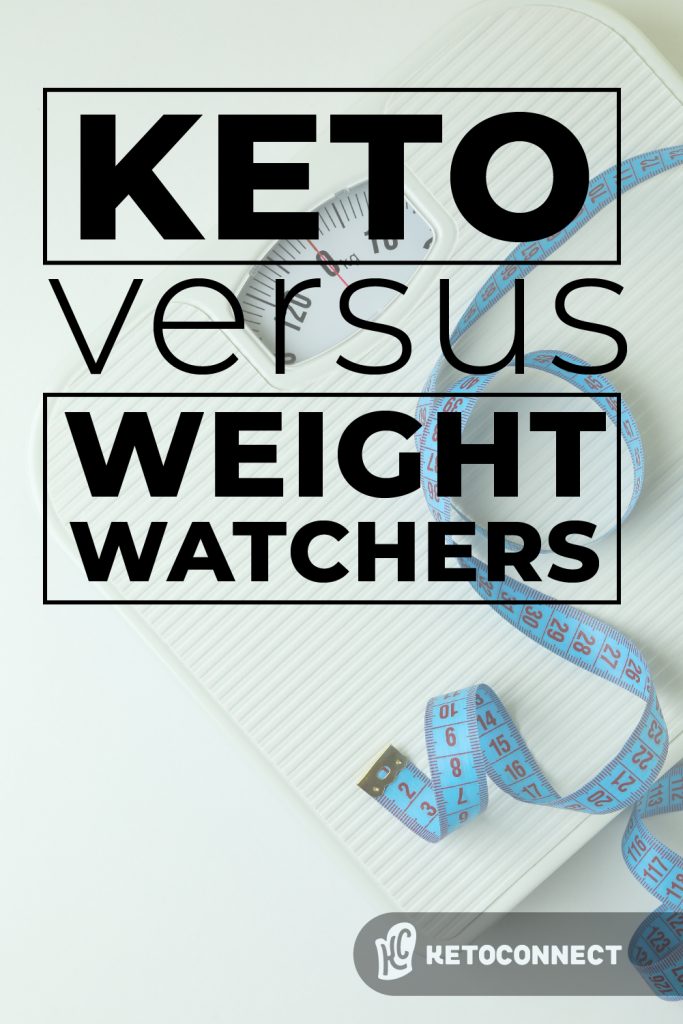Weight Watchers and Keto Diet
Are you struggling to lose weight? One of the main goals of Weight Watchers and ketogenic diets is to help people lose weight, and they're both backed by credible research and studies. So, which diet is better?

In short, a ketogenic diet is a better option since it reduces hunger, lowers insulin levels and is a more sustainable diet in the long term. Several studies show that those who follow Weight Watchers tend to regain their weight over time.
This post covers the pros and cons of Weight Watchers vs keto.
What's The Difference Between Weight Watchers and Keto?
Weight Watchers International is a global company offering a weight loss program to around 5 million people. Jean Nidetech founded Weight Watchers in 1963 in New York.
One factor that attracts millions of people to Weight Watchers is that no foods are off-limits. Weight Watchers don't control what foods you eat.
Instead, it uses a points system that assigns different point values to foods based on calorie, fat, protein and sugar content. It doesn't sell a lose weight fast dream like other programs, instead, it aims for you to lose around one to two pounds per week.
When starting the program, you're given a set amount of daily points, and you must stay below it to reach your desired weight-loss goal. Healthier foods are lower in points than unhealthy foods like candy and soda.
For example, a sugar-filled doughnut might be 10 points, while yogurt with strawberries only costs two points.
This is the big difference between Weight Watchers and keto. Weight Watchers purely focuses on losing weight, while a ketogenic diet emphasizes health and nutrition.
The ketogenic diet isn't a plan you have to buy or sign up for. You also don't have to restrict calories. The keto diet is simply a shift in how you eat, and it turns your body into a fat-burning machine. A keto diet is a high fat, low carb and moderate protein diet.
Eating a lot of healthy fats and little carbs puts your body into ketosis, a metabolic state where you burn fat instead of glucose for fuel. This leads to weight loss without having to restrict calories.
Some other benefits of a keto diet include:
- Increased energy
- Fewer carb cravings
- Reduces risk of certain cancers
- Improved brain health
These benefits are a breath of fresh air if you're dieting, but you're tired and hungry all the time.
Now that we know the differences between Weight Watchers and keto, let's look at a medical paper that compares the two diets.

What Does Medical Research Say?
A recent research study compared the Weight Watchers diet app to a ketogenic app called Keyto.
Researchers randomly put participants in either the Weight Watchers group or the Keyto group.
The senior researcher conducting this study was Dr. Ethan Weiss, and he found that after 12 weeks, the keto group lost 12 pounds. The Weight Watchers results were 5.5 pounds lost.
Researchers reached out to participants after 24 weeks, and the keto group continued to lose weight. They lost 18.5 pounds in total while the Weight Watchers group stalled out, only losing 6 pounds. This suggests that Weight Watchers might only be a practical option for short-term weight-loss.
However, weight wasn't the only health marker that researchers measured.
Researchers tested the A1C levels of participants. The A1C test is a blood test that's used to diagnose diabetes. A healthy A1C level is below 5.7%.
After 12 weeks, the keto participants lowered their A1C level by 0.2%; doing better than most prescription drugs.
The Weight Watchers group decreased their A1C levels by 0.1%, 50% less than those following a keto diet.
They also checked for alkaline phosphatase which is a marker for a kidney or liver condition like fatty liver disease. The keto group lowered their alkaline phosphatase by seven points while the Weight Watchers group's levels actually increased by one point.
Now that we know what scientific studies say, let's cover why keto outperforms Weight Watchers.
The Problem With Weight Watchers
A few fundamental flaws in the Weight Watchers weight loss programs prevent people from reaching their goals. Some of these flaws include:
- Weight Watchers puts emphasis on losing weight not being healthy
- The low-fat diet increases insulin resistance
- Weight Watchers promotes hunger and fatigue
Weight Watchers Puts Emphasis On Losing Weight Not Being Healthy
Weight Watchers is a calorie restrictive diet. So you can eat any food, including chips, candy, and soda, as long as you stay below your daily points limit. This is the big problem with Weight Watchers. It measures calories but doesn't measure the nutritional value of your food.
Sometimes dieters will skip a few meals so they can save up points for a trip to their favorite fast-food chain. This is unhealthy and leads to chronic inflammation and nutritional deficiencies.
You might still lose weight with calorie counting, but that doesn't mean you're getting healthier.
It Increases Insulin Resistance
When following a Weight Watchers diet plan, you can eat unlimited amounts of fruit per day since it doesn't add points to your daily allowance.
And although fruit contains necessary nutrients, it also contains lots of sugar and carbs, which spike blood glucose levels and insulin. For example, a medium-sized banana contains around 23 grams of carbs and 12 grams of simple sugars.
So if you're eating three bananas per day, that's almost 70 grams of carbs and 36 grams of sugar.
This quick flood of glucose spikes blood sugar leading to higher insulin levels. High insulin is a problem since it leads to insulin resistance and weight gain.
Weight Watchers Promotes Hunger And Fatigue
High levels of insulin negatively affect the hormones in your body that are responsible for hunger and fatigue.
With high insulin levels, a hormone called hormone-sensitive lipase becomes less active. Hormone-sensitive lipase is responsible for breaking down stored fat for energy.
On a high-carb meal plan like Weight Watchers, your body cannot convert body fat to energy when you're hungry and feel lethargic.
Also, insulin blocks leptin. Leptin is the hormone that tells your brain when to stop eating. When you become leptin resistant, your brain doesn't ask you to stop eating, leading to more hunger and weight gain.
Now let's see how a keto diet fixes these problems.

Why Keto Is The Better Option
This is how following a high-fat diet allows you to reach your health and weight-loss goals faster than a Weight Watchers meal plan:
- Keto focuses on improving health
- It reduces appetite
- Keto helps manage chronic diseases like diabetes
- It reduces chronic inflammation
- A keto diet is fun
Keto Focuses On Improving Health
When people start eating a low-carb diet, they often report feeling lethargic. This is called "keto flu." During this stage, your body gets used to using ketones as a primary source of fuel. However, after this stage, you'll notice a consistent boost in energy.
This increased energy is thanks to ketones since it's a powerful fuel source for your brain and manages brain diseases like Alzheimer's.
Also, when eating a low-carb diet, you emphasize nutrient-dense, healthy foods like fatty steaks, organ meats, fish, coconut oil and avocados. This gives your body the necessary nutrients to thrive.
Food quality on a keto diet is much higher compared to a Weight Watchers plan. What you eat on Weight Watchers doesn't matter. It's all about counting points.
It Reduces Appetite
When eating a ketogenic diet, your carb intake is limited. This lowers insulin levels since protein and fats don't spike insulin as much as carbs. With low insulin, it's super easy for your brain to read leptin levels, keeping you fuller for longer.
On Weight Watchers, you'll need to restrict calories and your carb intake can get as high as 65%. Eating three meals a day that contains so many carbs will spike insulin, making it difficult for your brain to read leptin levels, so you feel hungry all the time.
Keto dieting is easy and effective. You basically eat until your brain tells you to stop.
The Ketogenic Diet Manages Diabetes And Other Chronic Diseases
Research shows that low-carb diets are some of the best diets for people with diabetes and prediabetes. Tom Watson even reversed type 2 diabetes after reading The Pioppi Diet by Aseem Malhotra and The Fast Diet by Michael Mosley. Both books recommended the removal of carbs for diabetes patients.
While trying to manage his diabetes, Watson lost almost 100 pounds.
Medical experts like Dr. Ted Naiman, Dr. David Unwin, and Dr. Jason Fung uses a ketogenic diet to treat people living with diabetes.
When following a Weight Watchers diet, you'll be eating rice, bread, fruit, and even candy. This quick rush of glucose spikes your blood sugar levels and leads to insulin resistance. So if you're looking to lose weight and manage diabetes, a ketogenic diet is the way to go.
Reduced Chronic Inflammation
Inflammation is a good thing.
It's your body's natural defense against threats. For example, if you're injured, your body triggers inflammation to prevent external threats from entering.
However, you won't want to be in this state all the time.
When eating processed foods like candy or soda, your body sees this as an external threat and triggers inflammation to help protect itself. If you're on a Weight Watchers diet and eating processed foods a few times per week, your body will constantly be in defense mode.
This is called chronic inflammation, and it may be the root of all diseases.
Everything from cancer to autoimmune disease and arthritis can be traced back to chronic inflammation.
Fortunately, with a ketogenic diet, you cut out all inflammation-causing foods and replace them with healthy food choices resulting in lower levels of inflammation.
Weight Loss Is Fun On A Keto Diet
I saved the best benefit for last. Doing a keto diet is a lot of fun.
When you're following the Weight Watchers diet plan, you need to count points and restrict calories. You'll also need to weigh yourself in front of other people regularly. This can be demotivating if you're not seeing any progress.
But with a keto diet, you can eat fatty meats, ribs, avocado, bacon, eggs, chicken, fish, and other tasty foods. Yeah, you can't eat carbs, but you rarely crave carbs on a keto diet. And who'll miss bread and starchy vegetables when you can eat keto-friendly recipes like a fatty piece of steak with scrambled eggs?
With the Weight Watchers point system, food restriction is a real struggle. If you've used up all your points for the day, you can't eat until tomorrow.
With keto, your brain can finally read your leptin levels. So all you need to do is eat until you're full.
Read our blog post on keto vs paleo for more diet comparisons.

Weight Watchers vs Keto – Final Word
Weight Watchers and keto diets are some of the most popular diets. And although they might seem like they're trying to reach the same goals, there are some fundamental differences.
With Weight Watchers, you restrict calories to lose weight. But this doesn't necessarily mean better health.
When following a keto diet, you're focusing on living a healthy lifestyle by eating low-carb, nutrient-dense foods and weight loss is simply a byproduct.

Source: https://www.ketoconnect.net/weight-watchers-vs-keto/